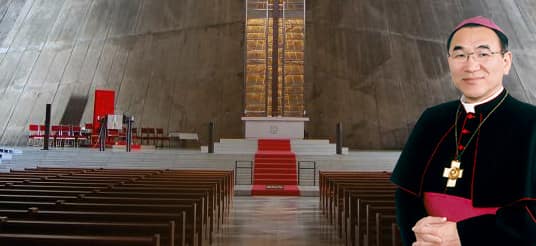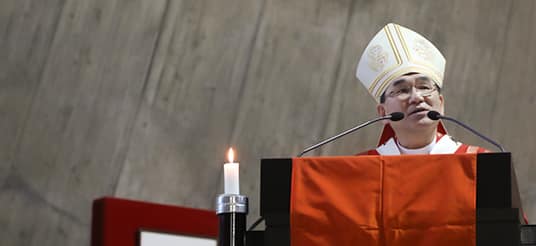Archbishop

Re: HOLY COMMUNION IN TIMES OF EMERGENCY
20/06/2020
19 June 2020
Dear brothers and sisters in the Archdiocese of Tokyo:
Re: HOLY COMMUNION IN TIMES OF EMERGENCY
As church activities resume in stages from 21 June, we are once again given the opportunity, though for some it may not be weekly, to attend the Holy Mass and receive Holy Communion. My heartfelt gratitude to the many people who, for a long period of time, suffered from spiritual thirst and made sacrifices due to the suspension of church activities.
Although in comparison to other countries Japan has fewer number of confirmed COVID-19 infections and related deaths, the reason for this has not been clarified and the cases of infection itself has not ended. In addition, although the number of infections among elderly people is low, the percentage of those who become seriously ill and fatal is high. Thus, for the time being, we believe it is necessary to carefully respond to the situation, while prevention and treatment methods have not yet been established.
As we resume church activities, it really pains me to set forth certain restrictions different from our usual situation before. But I appeal to all of you so that as much as possible not one person who comes to church will be exposed to infection nor the risk of death during prayers. To achieve this, it would be necessary to take various measures such as emergency precautions and gradually bringing the situation back to normal.
Trusting in everyone’s good judgment, I encourage all of you to be concerned not merely about protecting oneself from COVID-19 infections, but rather to think about how we can protect others from infection with the coronavirus. As this is true for all the faithful, the same goes also for our priests, many of whom are elderly. Therefore let us keep in mind the prescribed restrictions for the meantime so that we do not risk the lives of others. As public masses resume, it is essential for each person to recognize that they might already be carriers of infection. The various restrictions set by the Church are not “prohibitions” but rather a request for “careful judgment based on the common good” to protect each other’s lives.
While looking at the situation of our society as a whole, we continue to make careful considerations everyday so that we can return back to our normal conditions as soon as we can. Therefore, I sincerely ask all of you to please bear with the inconveniences for the time being.
Taking this into account, we have been receiving one inquiry after another regarding the reception of Holy Communion. Japanese churches at present mainly practice Communion by hand. However, this does not mean that Communion by mouth is prohibited. Such is the practice during normal times. But for reasons stated below, we are requesting that as much as possible everyone receive Communion by hand during the early stages of the resumption of public masses. If anyone wishes to receive Communion by mouth, it is possible to make special arrangements for Communion outside of the Holy Mass, but only after consultation with the parish priest.
The World Health Organization (WHO) has claimed that droplets generated by an infected person by coughing, sneezing, or talking in close contact is the main routine of 2019-nCoV transmission besides touching contaminated surfaces without washing hands. In other words, we cannot say that there is no possibility for the hands and mouth to be contaminated with the coronavirus. Strictly speaking, there are medical personnel who would even point out that it is not safe to resume at this point the distribution of Holy Communion either by hand or mouth.
However, it has been reported that with alcohol disinfection the novel coronavirus could be killed, and disinfection of hands with alcohol would be easy to do. In fact, with the resumption of public masses, we are requesting all the faithful to disinfect their hands with alcohol before entering the church. It is also recommended that priests and extraordinary ministers of Holy Communion, disinfect their hands with alcohol once again before distributing the Sacred Hosts. And depending on the circumstances, it is permitted that the altar servers disinfect with alcohol the hands of those falling in line before they receive Holy Communion.
However, it is not realistic for all those attending the Mass to rinse orally with mouthwash before the Mass or just before Communion. In other words, unlike the hands, it is impossible to have the mouth properly disinfected before receiving Communion.
The following information are derived from the latest academic paper on the novel coronavirus entitled “Saliva: Potential diagnostic value and transmission of 2019-nCoV” (International Journal of Oral Science article number 11,2020),
・Saliva causes transmission of the new coronavirus upon close contact (90% of patients positive with the virus has been diagnosed in the saliva).
・The saliva droplets containing the virus are generated not only when coughing and sneezing, but also when breathing.
・Even if a person is wearing a medical (N95) mask, the novel coronavirus can still be transmitted through the mucous membranes of the eyes.
According to the Infectious Disease Surveillance Center of the National Institute of Infectious Diseases, a person who wears a mask and gets in contact with an infected person only for a short period of time is unlikely to be considered as “close contact.” On the other hand, those who have direct contact with contaminated matter such as respiratory tract secretions or body fluids of patients (confirmed cases) would possibly be considered “close contact.”
From the above, Communion by mouth at this point poses a higher risk in endangering the lives of priests and extraordinary ministers of Holy Communion who distribute the Sacred Hosts in comparison with Communion by hand.
According to some reference materials such as the guide prepared by the American Catholic Medical Association, in order to have the Communion by mouth, it would be necessary to take measures such as hand disinfection each time by the priest or extraordinary minister of Holy Communion. Therefore, as mentioned above, Communion by mouth would not be administered during the Holy Mass, but would be administered separately, perhaps after the Holy Mass, only upon consultation with the parish priest. This is to give time for the priest and the extraordinary ministers of Holy Communion to disinfect their hands each time the Sacred Host is distributed to every communicant. I would really appreciate your kind consideration on the matter.
I ask earnestly for your cooperation in protecting the life of our priests, who have become less in number and many of them elderly. I also ask for your concern for our faithful who serve the community that they may be protected from danger.
My dear brothers and sisters in the Tokyo Archdiocese, keeping in mind that “we shall not threaten the health and life of others,” let us come and celebrate once again at Holy Mass with compassion for each other.
Tarcisio Isao Kikuchi, SVD
Archbishop of Tokyo





